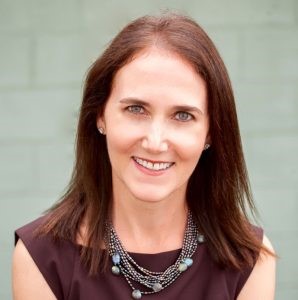 Growing up in a household where her father’s genetic hearing loss was treated as shameful made it hard for Shari to confront her own progressive hearing issues as an adult. She now seeks to educate people about living with hearing loss and to create a community for others with hearing loss.
Growing up in a household where her father’s genetic hearing loss was treated as shameful made it hard for Shari to confront her own progressive hearing issues as an adult. She now seeks to educate people about living with hearing loss and to create a community for others with hearing loss.
Tell us a little about your background…
I grew up in New Jersey, the older of two sisters. I was always a tomboy, playing on my town’s softball team—even stealing home base once. In high school, I turned my attention to modern dance and my studies.
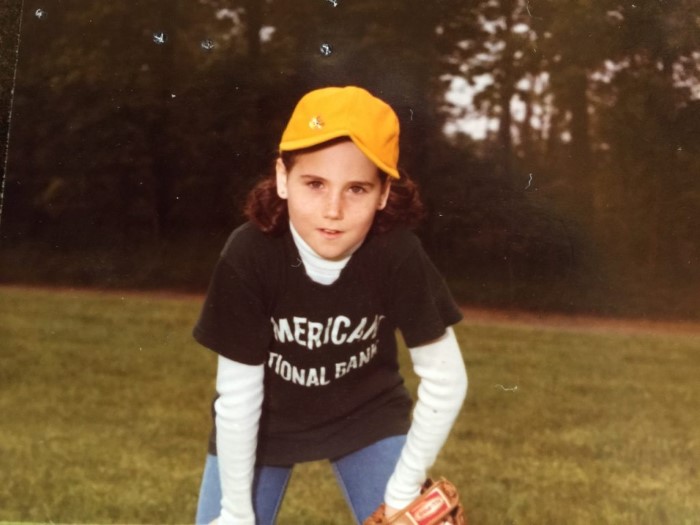
Me at 10, playing softball
We were a fairly typical family, with one exception, my father’s hearing loss. It was genetic and began in midlife. As a child, I was not always aware of his problems hearing. I knew he wore hearing aids, but I didn’t see how he struggled with embarrassment and shame, hiding his hearing loss to the detriment of his career, his personal relationships, and our family life.
I do remember one time at a party when I found him sitting alone off in the corner. I asked him why, and his reply was, “If someone wants to talk to me, they can come find me.” I didn’t think much of it at the time, but now I realize that he probably found socializing in the loud room challenging and was seeking refuge from the embarrassment of trying to converse when he could not hear. I struggle with that same problem today.
My family was not supportive of him. I remember my mother whispering secrets to my sister and me behind his back. When we looked concerned by this behavior, she commented, “Don’t worry, he can’t hear us.” Her actions taught me that hearing loss was something shameful and bad, and something my father had to tackle alone. Thinking back on it, I am horrified by our lack of compassion.
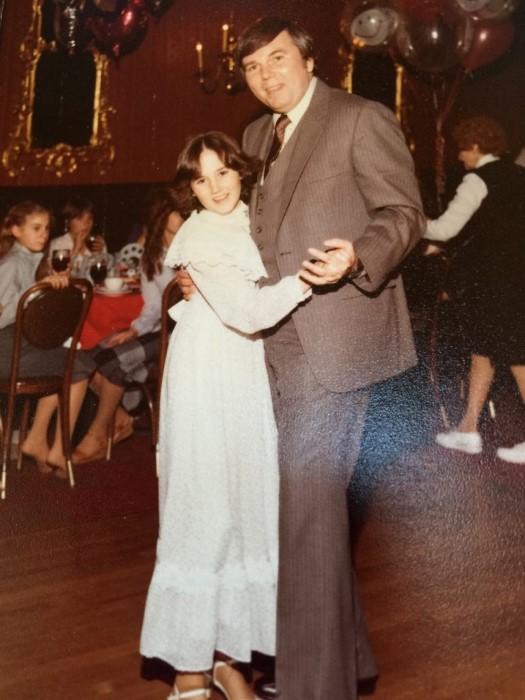
With my dad, at age 12
I always enjoyed school and graduated at the top of my class, heading to college and then to New York City for a career in finance. My life in New York was great—my career was progressing well, I found love and friendship, and I fully enjoyed my life as an independent young adult. I took my hearing for granted, as most people do.
After a few years of working, I decided to return to business school. It was there, in my mid-20s, that I first noticed my hearing loss. It became difficult for me to follow some of the comments that the other students made in class, particularly ones that were said as a joke or as an aside. Given my family history of hearing loss, I decided to get tested. The diagnosis of mild hearing loss was not a surprise, but it was devastating nonetheless. I remembered my father’s struggles and wondered if they would also be mine. For the moment, the loss was minor enough to ignore. So I did.
After graduation, I moved back to New York City, got married, and jumped back into my career, working hard to develop a following as an equity analyst covering retail stocks. I enjoyed my job as an analyst—I always liked math and spreadsheets, and I got plenty of that. My job also involved a lot of writing, which had never been a passion of mine. But as the years passed, I honed my craft, enjoying the excitement of finding the right headline to grab my client’s attention. It was here that I learned the power that the written word had to influence, inspire, and terrorize.
I remember one report I wrote about a retail company that was not performing well. I was critical of the company’s strategy, but more so of the CEO’s inability to set a clear plan and to execute on it. My goal in writing the piece was to educate my clients, not to harm the CEO. Nevertheless, the next time I saw him, he ripped into me, telling me how I had embarrassed him in front of his family and the world. While I didn’t feel that I had done anything wrong, this experience taught me how impactful the written word can be. I take that responsibility very seriously in my writing today.
My hearing loss worsened. While I continued to ignore it as best as I could, I finally broke down and purchased hearing aids. I would wear them for work when I needed them, but never socially or at home with my family. I remember sneaking them into my ears in the taxi on the way to work, and ripping them from ears in the elevator on the way out of the building at night. I am amazed I was able to keep it a secret, but I did.

My honeymoon
When did you start to think about making a change?
My career progressed, and so did my family life. I gave birth to a beautiful baby girl and, two years later, to a bouncing baby boy. It became more difficult to balance the travel and late nights demanded by my career with the allure of evenings at home with my children. I decided to move into a managerial role, where I could continue to utilize my financial analysis and writing skills, but have better control over my hours.
This went well for a period of years, but I hadn’t expected the difficultly my hearing loss could bring to my role as a manager. As an equity analyst, most of my work was done in a quiet office at my computer, or speaking on the phone (amplified) with clients. I was able to pop my hearing aids in and out as I needed them for meetings and conferences. I quickly learned which clients were hard for me to hear so I could prepare in advance.
But as a manager, it was much tougher. People would come into my office and tell me their secrets—“my mother is sick,” or “I am pregnant,” or “I hate working with my boss.” These types of confessions are not often spoken in a loud and clear voice with maintained eye contact, making them harder to hear, and the sensitive nature of the communication makes it difficult to ask people to repeat what they said in a louder voice! But still, I adapted, wearing my hearing aids all the time at the office now, and was able to function well most of the time.
A few years into my management role, in 2008, the market and the economy went into a steep downturn. Financial institutions were under significant pressure and my job function began to change. Rather than spending my days mentoring our up-and-coming analysts, I was in meetings debating how many and which ones should be fired. This continued for several years, at which point, I felt demoralized. I had lost interest in my work. Having survived the numerous rounds of cuts in my own department, I voluntarily decided to retire, in 2010, at age 41, hoping to find more rewarding work outside the day-to-day grind of financial services.
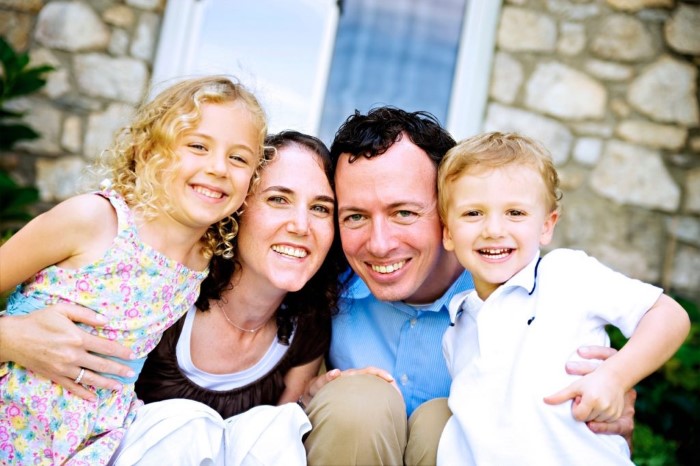
Our young family, 2008
What is your next act?
 I am a hearing health advocate.
I am a hearing health advocate.
I write a blog called Living With Hearing Loss to share the ups and downs of living with hearing loss and to build a community for others with hearing loss. My goal for the blog is to help others live more comfortably with their own hearing loss. My most popular posts discuss the difficulties of living with hearing loss, but I always try to include some tips or suggestions on how to counteract these challenges in the post. Examples of this include 5 Things I Wish Everyone Knew About Hearing Loss and Do You Get Hearing Loss Exhaustion? Other popular posts include tips for things like How To Choose A Restaurant When You Have Hearing Loss or How To Have A Better Conversation With Someone With Hearing Loss.
I am on the Board of Directors of Hearing Health Foundation, the largest nonprofit funder of hearing research for a cure.
I am also on the Board of Trustees for Hearing Loss Association of America (HLAA), an organization dedicated to enabling people with hearing loss to live life fully and without compromise.
My advocacy work continues to grow as I strive to expand coverage of hearing loss in the mainstream media. Writing for Huffington Post and Good Housekeeping provides a platform to talk about hearing loss outside of the hearing loss community that already cares about it. It is challenging, because hearing loss is not often seen as “newsworthy” or as “sexy” as other illnesses or disabilities. I find this surprising given how widespread hearing loss is (50 million Americans!) and the strong links between hearing loss and devastating diseases like diabetes and dementia. You can see my writing on Huffington Post here. My favorite piece on Good Housekeeping is called I No Longer Feel Shame About My Hearing Loss.
So, I keep trying. The more that hearing loss can become a regular part of the health care dialogue and the more the general population can understand the risks and difficulties of hearing loss, the more the stigma will fade. Without stigma, even greater improvements in technology and legislation will become the norm for the millions of people living with hearing loss.
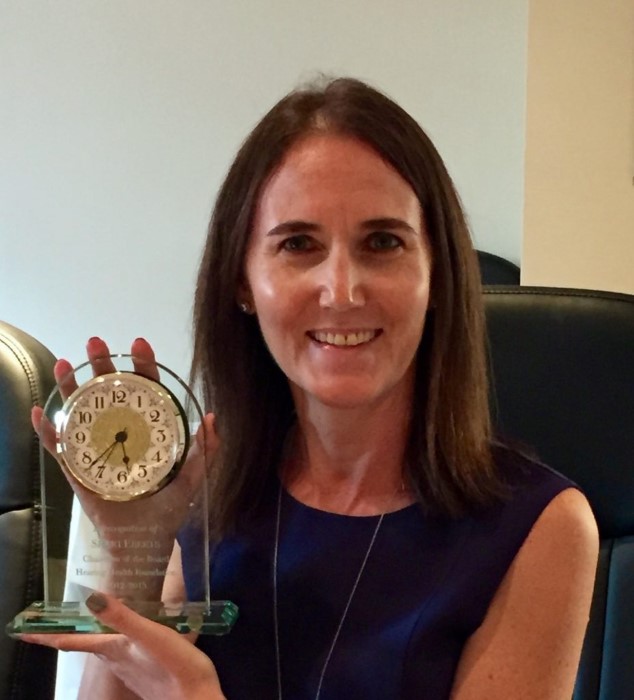
Recognition Award for my service as HHF Board Chair
How did you become a hearing health advocate?
After my early retirement, looking out at my upcoming days filled with unscheduled time was frightening, but also exhilarating. I had the time to think through what was important to me and to choose a new path. I started practicing yoga regularly and exploring various ideas for what could come next.
Part of this exploration was looking into getting involved in the hearing loss space. While I was still hiding my hearing loss from almost everyone in my life (my father’s influence was still at play), I became aware of an organization called Hearing Health Foundation (it was called Deafness Research Foundation at the time) that was funding research towards a cure. A cure sounded good to me! I reached out and was soon involved on the Board of Directors, moving into the Board Chair role after a year.
Putting my business skills to good use, I worked with the Executive Director to conceptualize and launch a new way of doing hearing research—a consortium model, where scientists worked together to solve problems rather than competing with one another for funding. I am proud to say that the Hearing Restoration Project is in its fourth year and is making important strides in finding a way to regenerate the inner ear hair cells that could restore hearing for millions of people worldwide.
It was around this time that I started coming to terms with my own hearing loss. Up until this point, it had always been a heavily guarded secret, similar to how it was for my father. But as my children grew, I became concerned that they would start to notice me hiding my hearing loss, just as I had watched my father do. My hearing loss is genetic, so I may have passed it onto them as my father had done to me.
I needed to set a better example for my children than my family had set for me. I did not want them to feel the shame and stigma that my father and I both did. I needed to accept my hearing loss. So I did.
My work at Hearing Health Foundation made it a lot easier. People asked me why I was involved with the organization and it was a great excuse to tell them about my hearing loss. In most cases, they would go on to tell me about a family member or friend who also had hearing loss. This should not be too surprising since there are 50 million of us in the United States alone.
As time went on, I grew bolder, becoming more proactive about disclosing my hearing loss and seeking accommodations like quieter tables at restaurants and caption devices at the movies. I was inspired to share my newfound acceptance with others, so that’s when I started my blog, Living With Hearing Loss.
Was anyone listening? Like most blogs, my first readers were friends and family but, over time, its reach began to grow. I started getting comments and emails from readers—other people with hearing loss from across the globe—sharing their struggles with me and thanking me for helping them feel less alone. There was one woman who sounded almost desperate for someone to talk to who would understand what she was experiencing. A man from Germany also didn’t know any others with hearing loss. I realized that the company of people who can understand what you are going through was incredibly important.
These interactions with readers helped me feel less alone and more empowered to increase my work as an advocate. I became involved with Hearing Loss Association of America (HLAA), and began attending chapter meetings in New York City. Through these chapter meetings, I connected with others in my local community who had hearing loss. They are now important friends and supports in my life. It is hard to imagine that I would not have known these inspiring, smart and incredible people if it were not for my hearing loss.
I recently joined the national board of HLAA and am excited to work with them to help break down the stigma of hearing loss, to encourage those with hidden hearing loss to come out of their hearing loss closets and seek treatment, and to improve the accommodations available for people with hearing loss through looping (induction looping is a sound system in which a loop of wire around an area in a building, such as a theater, produces an electromagnetic signal received directly by hearing aids), captioning, and better insurance coverage. There is much important work to do while we wait for the scientists to make progress on a cure.
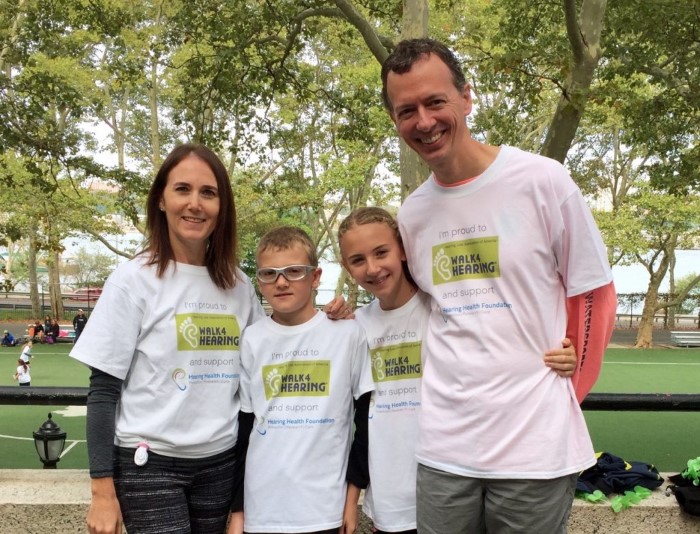
HLAA Walk 4 Hearing in New York City
Why did you choose this next act?
This next act was driven primarily by my love for my children. Since my hearing loss is genetic, I may have passed it onto them. It is adult-onset, so we won’t know for 15 years or so, giving me plenty of time to change the face of hearing loss—medically, legislatively and socially—before they may need to experience it. I want them to avoid feeling the shame and social stigma that I faced early on and that destroyed my father’s life.
Involving them in my work has been fun. My son helps me scope out the best seat in any restaurant so I can hear my best, and my daughter boldly wears her earplugs at school dances and events. They both help me think of good topics to write about on my blog. I am proud of their attitudes about hearing loss and feel confident that they will be much better prepared than I was, should they need to face these challenges.
What other options did you consider?
I had also considered writing a book about my experiences working on Wall Street and providing tips for those graduating from college and business school on how to get a job there. However, once I became involved in my hearing loss work, this quickly faded into the background. Its importance as a topic paled in comparison to the difference I could make for other people with hearing loss.
How hard was it to take the plunge?
For me, the plunge was more like a gentle wade into welcoming waters. Each step that I took to deepen my work as a hearing health advocate seemed to flow naturally from the next. I can’t imagine dedicating my time to anything else at this point.
How supportive were your family and friends?
My family and friends have been incredibly supportive. As I have become more comfortable talking about my hearing loss, it has become just a regular topic of conversation, not one whispered about or referred to only in code. Nobody blinks when I rearrange the seating arrangement at the table or move people around at a family gathering so I can hear them better. It’s not perfect—I still have difficulty hearing certain family members more than others and I can get frustrated and exhausted from working so hard to hear every day—but being open about it allows for solutions to be found.
I am very lucky to have such a supportive husband and two wonderful children who don’t treat my hearing loss as something shameful, but as a simple fact of life that needs to be incorporated into the family dynamic. They try their best to follow communication best practices so that I can hear them better. I do my best to keep my frustration in check and we all make it work. There is no other option.

What challenges did you encounter?
The primary challenge I encountered was my own fear. Could I develop a new life for myself outside the hard driving finance career I had always envisioned? Could I open myself up to others, sharing my secrets and feelings in a way that would benefit not only my children and me, but also others with hearing loss? I have always been an incredibly private person so to put my life on display was a big change, but a worthwhile one. The feedback I have received has been very positive. I am always grateful when someone who has read a blog post reaches out to let me know it has touched him or her in some way. That is my goal.
Were there times when you thought about giving up?
There have been many ups and downs — the frustrations of learning how to have impact within the nonprofit sector rather than the private sector, the struggles to get mainstream media interested in the topic of hearing loss and to grow readership for my blog. But through it all, I have never considered quitting. The cause is too important and way too close to home.
Through this process, I learned that I could create a different life with hearing loss than my father had. Writing and publishing my first few blog posts was incredibly scary, but it was also cathartic. I find it incredibly therapeutic to write—particularly some of my more personal pieces. I have realized how rewarding it can be to share your true self with others.
I have also met many wonderful friends and colleagues because of my hearing loss and this new phase of my life, most of whom I would never had met otherwise. I am grateful for each and everyone one of them.
My only regret is not coming to terms with my hearing loss sooner. It takes people an average of 7-10 years from the time they start experiencing hearing loss to acknowledge it and take steps to treat it. It took me 10. That is a lot of lost time wasted on embarrassment and shame.
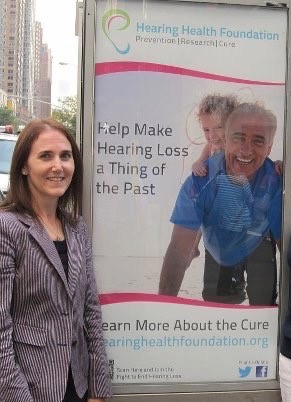
HHF Billboard we did to raise awareness about our search for a cure
What advice do you have for women seeking reinvention in midlife?
I think midlife is the perfect time for reinvention: We are more confident, more comfortable in our own skin, and more skilled at life. And perhaps, most importantly, we know what matters to us. Finding the passion for a cause or a new vocation can make all the difference in the amount of time and energy you want to apply to it. New challenges keep us feeling young and vibrant—and who doesn’t want that? Go for it.
I spent so much time trying to hide my hearing loss and worrying about whether people would know that I couldn’t hear in various situations, that it was exhausting! My fear held me back from seeing friends and family, from attending the theater, from going to meetings at my children’s school, and many other things. All wasted time.
My advice—if you have a hearing loss, or some other disability you have been hiding—is to let the fear go and come clean. The quicker you do, the sooner you can get back to living your engaging and vibrant life. And for those people in your life who cannot handle this new truth, move on from them. You will be surprised how few of these people there are, and you may discover some new friends and supporters along the way.
What advice do you have for family and friends of those struggling with hearing loss?
For the family and friends of hearing loss, the most important thing you can do to be supportive is to help de-stigmatize the hearing loss by talking about it and encouraging your loved ones to do the same. Make it part of the normal conversation by asking them where they would like to sit to hear you best. Encourage them to take action to treat their hearing loss and to reach out to others with hearing loss for support through organizations like HLAA.
Try to follow these best practice rules of clear communication:
- Make sure you have the person’s attention before speaking.
- Face the person and speak clearly—speaking too loudly or exaggerating your mouth movements only makes it harder to lip read.
- Make sure the setting is well lit and that your mouth is visible.
- Turn down background noise which can distract from hearing speech.
- Ask the person with hearing loss how YOU can help them hear you better.
- And don’t say “never mind” if they didn’t hear you— this is dismissive and insulting. Try to rephrase what you said instead.
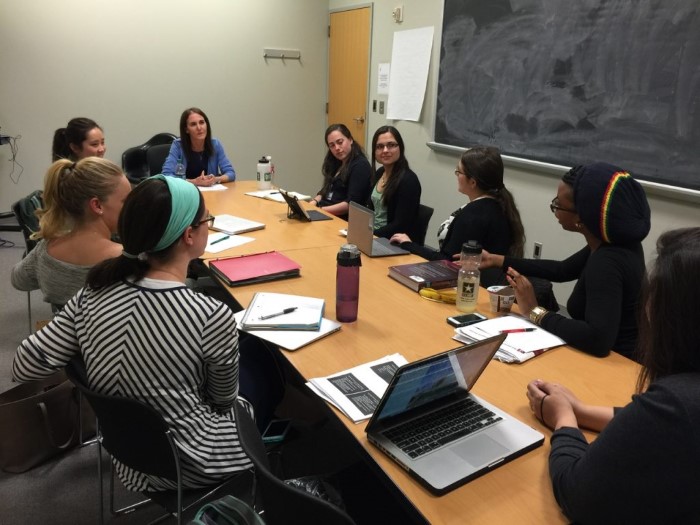
Speaking at a seminar class for doctoral audiology students
What resources do you recommend for those wishing to get better informed about hearing loss?
There are many great organizations working on hearing loss issues where you can get involved. For scientific research on hearing loss, I recommend learning more about Hearing Health Foundation and its Hearing Restoration Project, as well as Stanford’s Initiative To Cure Hearing Loss.
For hearing loss advocacy and to find hearing loss support groups on the national and local levels, visit Hearing Loss Association of America. To help shatter the stigma of hearing loss, visit HearStrong Foundation and be inspired by its growing list of HearStrong Champions.
For assistance in building a blog and submitting your writing for publication, check out these excellent websites and FaceBook groups: Women of Midlife and Blog Share Learn.
What’s next for you?
My next next act is to write a book based on my blog posts. I don’t have enough material yet, but every week it grows. I also hope to broaden the list of mainstream publications that will feature writing about hearing loss and related issues. And finally, my hope is that by sharing my hearing loss story, I will continue to help others to live more comfortably with their own hearing loss.
Contact Shari Eberts at shari@sharieberts.com
Twitter: @sharieberts
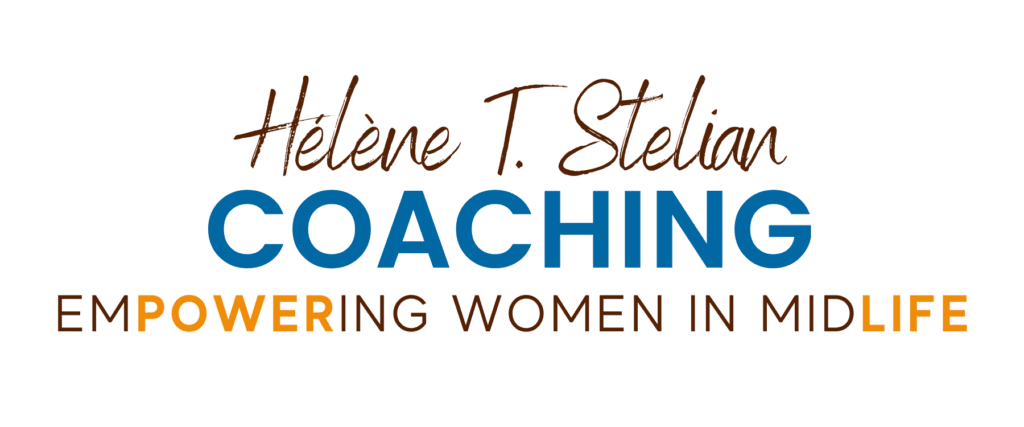
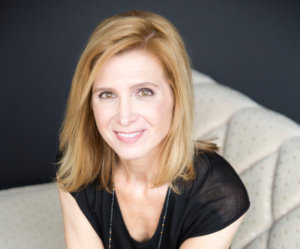
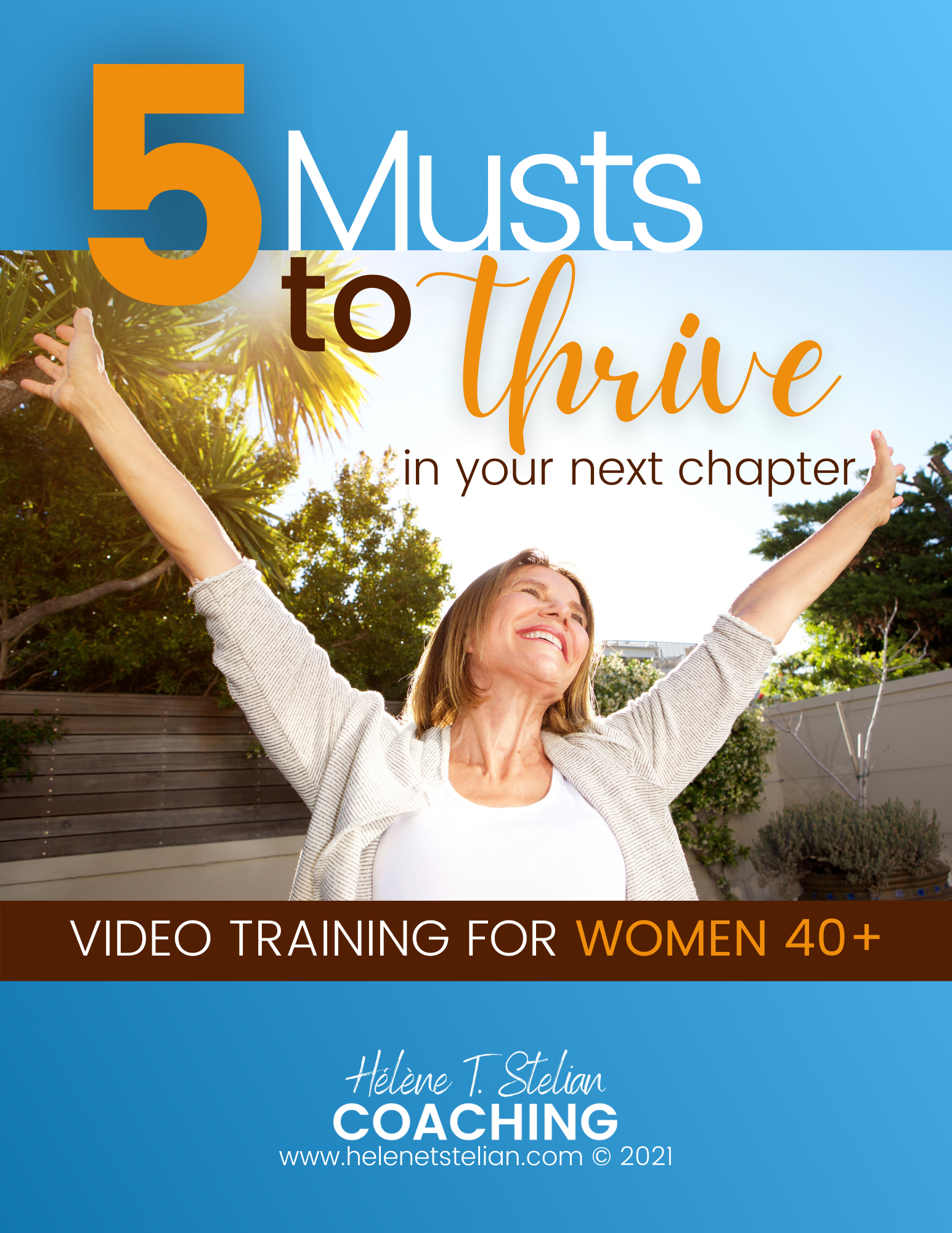



I love Shari’s blog. My good friend Sherry woke up with hearing loss. A zillion tests and the end result was inconclusive but she could not hear.Having a good friend with hearing loss is eye opening to the hearing crowd. Shari’s blog reminds me and everyone what we take for granted is not as easy to someone with a hearing loss and tips to accommodate rather than exclude.
Thanks so much for your support!
I have gained so much insite, encouragement, and hope for my journey with the new “me”. I am 2 years new to the truth and reality of what my hearing is and the role it has played in my entire life. I am 42, I have genetic otosclerosis.
I am finding myself constantly thinking “oh my gosh, now it makes sense” when recalling scenarios from my past.
I have been told that I must not be paying attention or just choosing to not listen. I have trouble remembering things, though I truly try to absorb and take in information. I have NEVER been comfortable with public speaking. I struggled all through school, even in elementary school. I have struggled with confidence for as long as I can remember. All of these struggles now make sense and I can begin to work towards healing, and no longer blaming myself for anything I did or didn’t do right. I have spent years thinking I should have done better. I thought if only I was smarter I could have…I think I tried, but maybe I really didnt…
You are so inspiring, Shari! I look forward to new posts from you and new information that you share. Hearing loss deserves a larger platform. One day I hope to play a role in the growth of available support, advocacy, and education of this disability that affects so many who don’t yet know, who choose to ignore, and who don’t care to acknowledge.
Thanks so much for your kind words and encouragement. It is amazing how hearing loss can sneak up on you. I am so glad that you know the truth about your condition and are taking the right steps to move forward in your life. Well done!
Thanks Shari your life story is great. I found out four months ago I have moderate hearing loss in both ears. I’m having a hard time dealing with this I’m letting it bother me too much. I will eventually accept it and get over it
Thanks for reading Shari’s story Jennifer and all the best to you as you navigate this new challenge.
well confident. brave lady
know well how to cope life’s difficulty …
Your blog has helped me with accepting my own hearing loss,when I really felt down about it.
Thank you for being so open about your life. I’m 55 and had acoustic neuroma surgery 11 months ago. I returned as a teacher and quickly found that being SSD make my life so incredibly difficult in a classroom setting. I’ve decided this is my last year teaching because the mental fatigue each day is overwhelming. I’ve stayed very positive throughout the surgery and recovery and always find the good, like sleeping so well!! But I’m nervous about where I can go from here. My goal was to retire and find a fun job like a cashier! lol But thinking of all the things I’d like to do, the hearing is now an issue. So I’m feeling a bit lost at the moment, but hearing others like you, inspires me to keep looking for my fit. Thank you!
You will find your fit Brenda! Thank you for sharing your story too.